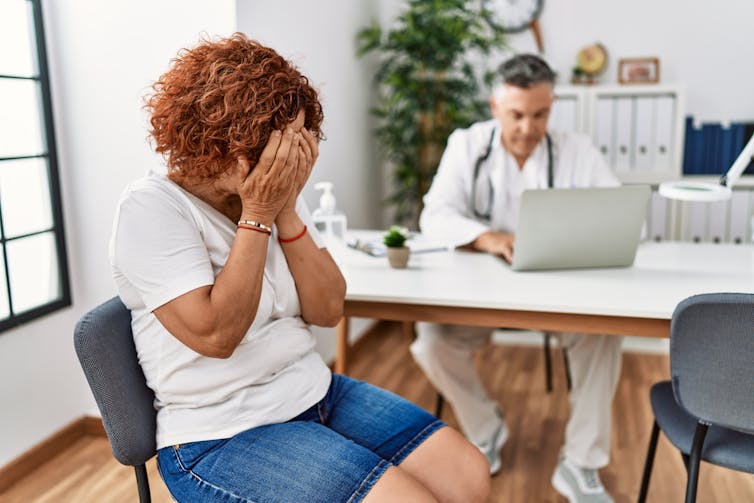Pelvic health problems – such as bladder and bowel leaks, pelvic pain, heavy menstrual bleeding or vaginal prolapse – are a common experience for women. Yet despite how common these issues are and the serious effect they can have on a woman’s life, research shows that most women don’t seek help from their doctor.
To find out what stops women from seeking medical help, we reviewed existing studies on the topic. We looked at 86 studies from several wealthy countries, including Australia, the US, the UK, Ireland, the Netherlands and Sweden. Altogether, we were able to look at the experiences of over 20,000 women.
We identified three main reasons women don’t seek care for pelvic symptoms. If you’re a woman, these reasons may not come as a surprise to you. But by better understanding what stands in the way of people getting help, we hope to improve the care sufferers receive.
1. Stigma
Stigma was the number one reason women didn’t seek help in 56% of studies. This often led to suffering for years with undiagnosed or untreated symptoms.
As one woman with urinary incontinence explained: “You don’t know why, you feel sort of ashamed, you feel embarrassed to talk about it, as if you are somehow a failure.”
Another woman who’d suffered from a pelvic prolapse, revealed: “I was embarrassed to speak to anybody … about it for a long time. But now, I regret that I did that, because I left myself to a bad stage.”
The stigma and embarrassment women experienced led many to delay seeking help for around four years on average.
2. Lack of awareness
Another reason women didn’t seek help for pelvic issues was because many didn’t know if they should – and sometimes felt afraid to.
For instance, one woman who’d experienced a pelvic prolapse said: “I did not know that happened to women … I was scared because I didn’t know what it was.”
And because of this lack of knowledge, women often assumed their symptoms were normal and not a sign of a health issue. As one woman said: “I have some good friends, and my daughter … Well, they have the same problem … It’s age. That’s all we boil it down to is age. Nothing you can do about it.”
This lack of knowledge also caused many women to ignore their symptoms when they first began or feel that getting help with these symptoms wasn’t a priority.
3. Not being taken seriously
‘You’ve got a rectocele.’ ‘What is it?’ ‘Oh, you don’t need to know.’ Well, hey, if it’s to do with you, you’re the one person who needs to know about it. You shouldn’t be sort of kept like, ‘Oh, you’re a child being a nuisance. Go away. You don’t need to know.
This quote, from a woman who’d experienced a prolapse of the wall between the rectum and vagina, encapsulates a feeling that many interviewees had – that their concerns weren’t taken seriously.

Other women also reported delays in getting care because their symptoms were trivialised by doctors. One interviewee even revealed a doctor simply advised her to “wear a Kotex” when she told them she was constantly having bladder leaks.
Even when women asked for help with symptoms, the attitudes they encountered from some doctors delayed their care. A 20-year-old woman with pelvic pain reported being told by her doctor that she should maybe “learn to live with it”. She felt this was “a bit crazy” and that she wasn’t being taken seriously.
Even when participants were taken seriously, many felt their doctors lacked knowledge and training in providing the care they needed.
Improving care
Symptoms of pelvic health problems can be isolating and difficult to cope with. Study participants talked about the effect it had on their mental health and social life.
Knowing the main reasons women don’t seek help means we can now work to find solutions and ensure women don’t miss out on early, non-invasive interventions for a range of conditions. It will also mean they don’t miss out on social and work opportunities, and may improve their body image and quality of life.
Women should be able to access information about their pelvic health and know what’s normal, what’s not, what they can do about it – and when to seek professional help. They should feel they can speak to doctors and nurses without shame or embarrassment and without being dismissed or having their symptoms trivialised. But as our research has shown, this is often not the case.
To encourage women with common pelvic symptoms to seek help, we need to raise awareness and tackle stigma. Our next step is to develop a programme to enable GPs to be more open in discussing and assessing women for pelvic symptoms. This will help to tackle the trivialising of symptoms that women experience.
If you’re experiencing any pelvic health symptoms that are bothering you, be sure to speak with your doctor, nurse or physiotherapist. Too often women wait for their doctor to ask, but you should raise your concerns as soon as you can. If you don’t feel confident saying what’s bothering you out loud, write it down.

